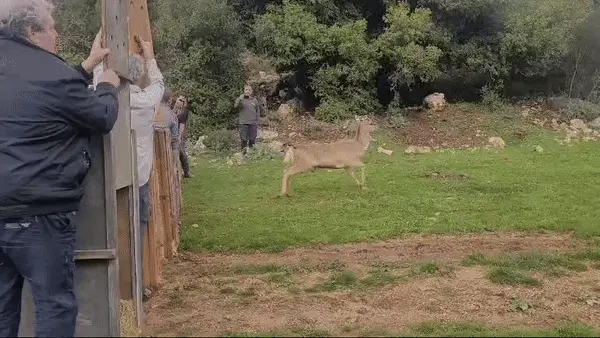6 wildebeests were released in the Upper Galilee, 20.2.24/Photo: Amit Dolev, Nature and Parks Authority
Six donkeys - four females and two males - were released yesterday (Tuesday) in the Upper Galilee.
A GPS collar was attached to the females in order to study their survival and movement pattern in the first year.
After a year the collar falls off and is recycled for reuse.
As we know, the Persian donkey became extinct in Israel and was reintroduced in an amazing story that involves determination, great efforts and not a little luck.
In order to return them to Israel, a small number of donkeys were brought to the Hai-Bar Carmel nature reserve, where a breeding nucleus was established from which donkeys are released into the wild every year, and today there is already a stable population that reproduces naturally in different parts of the country.
A GPS collar was attached to the females in order to study their survival and movement pattern.
The extremes, yesterday/The Nature and Parks Authority, Tal Polak
The donkeys have grown in the breeding nucleus at the Carmel Wildlife Center/The Nature and Parks Authority, Tal Polak
Maintaining open spaces and establishing crossings is essential for wildlife
The Persian wild boar, a large and noble mammal from the elk family, became extinct in the Israeli nature about a century ago due to continuous and uncontrolled hunting.
In the last three decades (from 1996), the Nature and Parks Authority began to return graves to nature in the Upper Galilee, Carmel and the Jerusalem mountains.
Amit Dolev, North District Ecologist: "We are trying to establish the population of donkeys in the Upper Galilee and Carmel, in addition to the one that was established in the Western Galilee. Many dangers threaten such animals in the wild, but maintaining a continuity of open areas and establishing crossings for wild animals above and below the roads is extremely essential for existence sustainable populations".
Today there is already a stable population of donkeys that reproduces naturally throughout the country/Nature and Parks Authority, Tal Pollak
And thanks to the liberators!/Nature and Gardens Authority, Tal Polak
In Israel about 300-400 individuals
The Persian horse was once common in dense forests in the eastern Mediterranean up to the Iran region.
In the 20th century, the species became extinct from most of its distribution areas.
From the beginning of the 20th century, the Persian donkey was no longer seen in the wild in Israel and the surrounding countries, nor was it found in any zoo.
The size of the Persian donkey population in Israel is estimated at about 300-400 individuals.
Over 200 individuals live in the Western and Upper Galilee, dozens more in Carmel and about 100 live in the Nahal Sorek area.
More on the same topic:
get worse
Animals

